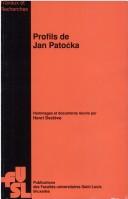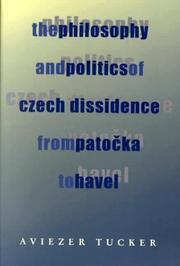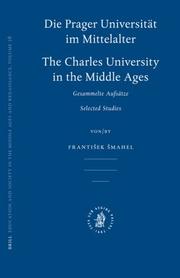| Listing 1 - 8 of 8 |
Sort by
|
Book

ISBN: 8024634104 9788024634104 9788024633893 Year: 2017 Publisher: Praha
Abstract | Keywords | Export | Availability | Bookmark
 Loading...
Loading...Choose an application
- Reference Manager
- EndNote
- RefWorks (Direct export to RefWorks)
Book
ISBN: 8021094583 9788021094581 9788021094574 Year: 2019 Publisher: Brno : Masarykova univerzita,
Abstract | Keywords | Export | Availability | Bookmark
 Loading...
Loading...Choose an application
- Reference Manager
- EndNote
- RefWorks (Direct export to RefWorks)
Book
ISBN: 8024638541 9788024638546 9788024638539 8024638533 Year: 2019 Publisher: Prague
Abstract | Keywords | Export | Availability | Bookmark
 Loading...
Loading...Choose an application
- Reference Manager
- EndNote
- RefWorks (Direct export to RefWorks)
Thought necessarily reflects the times. Following the tragedy of the Holocaust, this fact became ever more clear. And it may be the reason postwar philosophical texts are so difficult to understand, since they confront incomprehensibly traumatic experiences. In this first English-language translation of any of his books, Miroslav Petříček—one of the most influential and erudite Czech philosophers, and a student of Jan Patočka—argues that to exist in the second half of the twentieth century and beyond, Western philosophy has had to rewrite its tradition and its discourse, radically transforming itself. Should philosophy be capable of bearing witness to the time, Petříček contends, this metamorphosis in philosophy is necessary. Offering an original Central European perspective on postwar philosophical discourse that reflects upon the historical underpinnings of pop culture phenomena and complex philosophical schools—including Adorno, Agamben, Benjamin, Derrida, Husserl, Kracauer, and many others—Philosophy en noir is a record of this transformation.
Philosophy, Czech. --- Philosophy --- 20th century --- holocaust --- philosophy
Book
ISBN: 8024623617 9788024623610 9788024615929 9788024623610 Year: 2009 Publisher: Prague [Czech Republic]
Abstract | Keywords | Export | Availability | Bookmark
 Loading...
Loading...Choose an application
- Reference Manager
- EndNote
- RefWorks (Direct export to RefWorks)
Philosophy, Czech --- Environmental ethics. --- Environmental quality --- Human ecology --- Ethics --- Moral and ethical aspects --- Funda, Otakar A.
Book
ISBN: 8021094559 8021094540 Year: 2020 Publisher: Masaryk University Press
Abstract | Keywords | Export | Availability | Bookmark
 Loading...
Loading...Choose an application
- Reference Manager
- EndNote
- RefWorks (Direct export to RefWorks)
Title in English: Phenomenological-pragmatist interpretation of the hyper-connectivist world: on topics of philosophy of information Against the background of the ideas of selected phenomenologists (Martin Heidegger, Jan Patočka, Jan Sokol) and pragmatist philosophers (Marc Johnson, Georg Lakoff or Antonio Damasio), the monograph reflects the phenomenon of the philosophy of information in a new framework than Luciano Floridi does. The monograph takes much more on transforming the contemporary world and its relationship to education and thought. On the example of individual sub-facets, they form a comprehensive critical reflection on how it is possible with the philosophy of information and the philosophy of education. It strives to be a clear guide to the contemporary world, which is trying to think new ways.
Philosophy, Czech. --- Czech philosophy --- philosophy of information --- philosophy of education --- hyperconvivist era --- ICT --- pragmatism --- phenomenology

ISBN: 2802800825 9782802800828 2802803506 Year: 1992 Volume: 23 Publisher: Bruxelles Facultés universitaires Saint-Louis
Abstract | Keywords | Export | Availability | Bookmark
 Loading...
Loading...Choose an application
- Reference Manager
- EndNote
- RefWorks (Direct export to RefWorks)
De Jan Patočka (1907-1977) Vaclav Havel a écrit : « Il se consacrait entièrement à la philosophie et à son travail pédagogique. En même temps il savait que sa pensée devait un jour se refléter dans des actes. Et il savait aussi que ce dernier pas serait définitif, car il s'y tiendrait comme il tenait à ses opinions philosophiques. Il a payé littéralement de sa vie ce dévouement. J'ignore à quoi ressemblerait la charte 77 s'il n'avait pas, au début, illuminé son chemin par la clarté de sa personnalité. » À l'occasion de séances d'hommages tenues en 1984 à Vienne (Institut für die Wissenschaften vom Menschen), en 1987 à Bruxelles (Centre d'études Jan Patočka des Facultés universitaires Saint-Louis), et à Prague en 1991 (Institut International de Philosophie), des philosophes, amis de Patočka, évoquent, ce qui, dans sa longue reprise de la phénoménologie, a conduit sa méditation sur l'histoire et la culture jusqu'à cette éthique du quotidien plus forte que tout pouvoir politique. Trois lettres de Patočka viennent compléter ces profils.
History of philosophy --- Patočka, Jan --- Filosofie --- Patocka, J. --- Philosophie --- Philosophy, Czech --- Philosophie tchèque --- Patocka, Jan --- --mélanges --- --2651 --- Philosophie tchèque --- --Philosophie --- --Philosophy, Czech --- Philosophy --- pédagogie --- dévouement --- phénoménologie --- médiation --- quotidien

ISBN: 0822957280 0822941244 1306963389 0822972131 9780822972136 9781306963381 9780822957287 9780822941248 Year: 2000 Publisher: Pittsburgh : University of Pittsburgh Press,
Abstract | Keywords | Export | Availability | Bookmark
 Loading...
Loading...Choose an application
- Reference Manager
- EndNote
- RefWorks (Direct export to RefWorks)
Dissenters --- Philosophy, Czech --- Czechoslovakia --- Czech Republic --- Politics and government --- -Philosophy, Czech --- -Czech philosophy --- Dissidents --- Nonconformists --- Rebels (Social psychology) --- Conformity --- -Czechoslovakia --- -Politics and government --- -Dissenters --- -Chekhoslovakii︠a︡ --- Czechosłowacja --- Tsjechoslowakije --- Československá socialistická republika --- Czechoslovak Socialist Republic --- Chekhoslovat︠s︡kai︠a︡ Sot︠s︡ialisticheskai︠a︡ Respublika --- Čehoslovakija --- CSRS --- ČSSR --- Tschechoslowakei --- Tsjekkoslovakia --- Tsechoslobakia --- Tshīkūslūfākiyā --- Československo --- Československa republika --- Tchécoslovaquie --- Csehszlovákia --- Ceho-Slovacia --- ČSR --- Chieh-kʻo-ssu-lo-fa-kʻo --- Chieh-kʻo-ssu-lo-fa-kʻo she hui chu i kung ho kuo --- C.S.R.S. --- Č.S.S.R. --- Č.S.R. --- Cecoslovacchia --- Checoslovaquia --- Tschechische Sozialistische Republik --- Ts'ekhoslovaḳyah --- Czech and Slovak Federal Republic --- Česká a Slovenská Federativní Republika --- Česká a Slovenská Federatívna Republika --- Cseh-Szlovákia --- ČSFR --- ChSSR --- ChSFR --- Republika československa --- Češkoslovaška --- Czecho-Slovakia --- Česká republika --- ČR --- Tschechische Republik --- Česko --- Czechia --- チェコ --- Cheko --- チェコ共和国 --- Cheko Kyōwakoku --- Tschechien --- Tschechenland --- Tschechei --- République tchèque --- República Checa --- Chequia --- Txèquia --- Txeca --- República Txeca --- Češka --- Dissenters - Czechoslovakia. --- Philosophy, Czech - 20th century. --- Czechoslovakia - Politics and government - 1968-1989. --- Czech Republic - Politics and government - 1993 --- Graubünden --- Dissident --- Since 1900

ISSN: 09266070 ISBN: 1281457884 9786611457884 9047411498 9789047411499 9004154884 9789004154889 9781281457882 6611457887 Year: 2006 Volume: v. 28 Publisher: Leiden Brill
Abstract | Keywords | Export | Availability | Bookmark
 Loading...
Loading...Choose an application
- Reference Manager
- EndNote
- RefWorks (Direct export to RefWorks)
The present collection, divided into three thematic sections, includes twenty-one studies on the history of the University of Prague from its foundation in 1348 to the 16th century. The first section is devoted to the birth of the university, its first institutions, the growth of the earliest colleges and the victory of the Reformist party. The second part concentrates on the curriculum, examinations, graduations and annual disputations of the Faculty of Liberal Arts. Section three deals with university polemics about universalia realia, mainly in relation to the scholarly and literary activity of Jerome of Prague (+ 1416).
Universiteiten. --- Univerzita Karlova v Praze. --- Philosophy, Czech --- Universities and colleges --- Colleges --- Degree-granting institutions --- Higher education institutions --- Higher education providers --- Institutions of higher education --- Postsecondary institutions --- Public institutions --- Schools --- Education, Higher --- Czech philosophy --- History. --- Univerzita Karlova --- Universitas Carolina Pragensis --- Praag. --- 378.4 <081 SMAHEL, FRANTISEK> --- 378.4 <437 PRAHA> --- 378.4 <437 PRAHA> Universiteiten--Tsjechoslowakije--PRAHA --- Universiteiten--Tsjechoslowakije--PRAHA --- History --- Universiteiten--Verzameld werk van individuele auteurs--SMAHEL, FRANTISEK --- Universita Karlova --- Karlova universita --- Uniwersytet Karola --- Prague. --- Universidad Carolina Prague --- Université Charles IV --- Karls Universität --- Pražská univerzita --- Charles University --- Caroline University --- Universitas Carolina --- Prager Universität --- Prager Karlsuniversität --- Karlov universitet --- Charles University of Prague --- Université Charles à Prague --- Universita Karlova v Praze --- Univerzita Karlova v Praze --- Karlov universitet Pragi --- Uniwersytet im. Karola w Pradze --- UK --- Karlsuniversität --- CU --- Charles University in Prague --- Universidad Carolina --- Karlov universitet v Prage --- Карлов университет в Праге --- Universitatea Carolina --- Česká universita Karlo-Ferdinandova
| Listing 1 - 8 of 8 |
Sort by
|

 Search
Search Feedback
Feedback About UniCat
About UniCat  Help
Help News
News